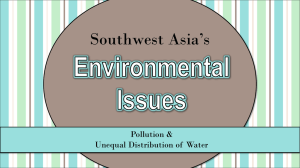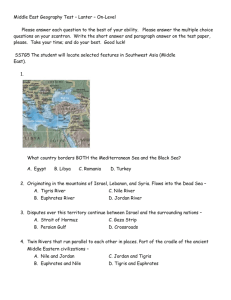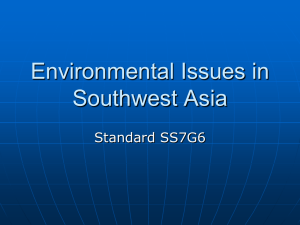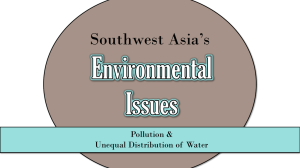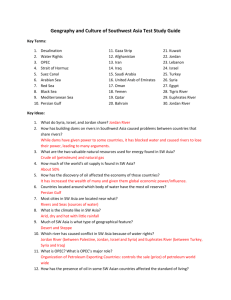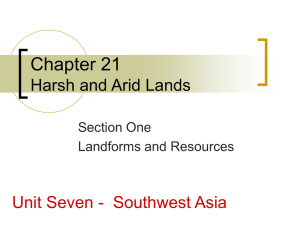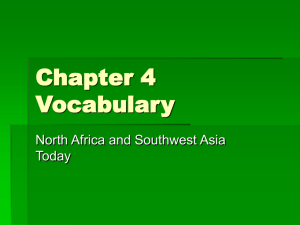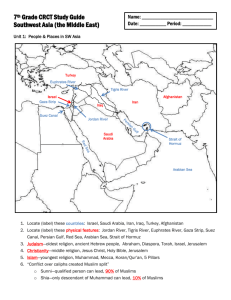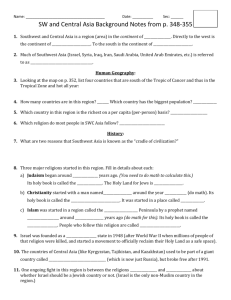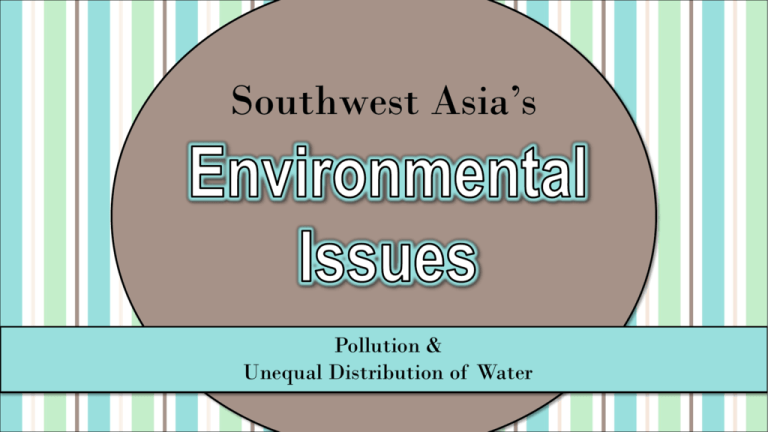
Southwest Asia’s
Pollution &
Unequal Distribution of Water
Standards
SS7G6 The student will discuss environmental issues
across Southwest Asia (Middle East).
a. Explain how water pollution and the unequal
distribution of water impacts irrigation and drinking
water.
Teachers
•
Print off the following page for each student.
•
Before the presentation, have the students make predictions about the
answers.
•
After the presentation, have the students correct their predictions.
Discuss the correct answers as a class to be sure that everyone now has
the correct answer.
*You could also use this as a quiz grade!
Teachers
•
Print off the following page for each student.
•
Before the presentation, have the students write down everything that
they already know about each country (location, language, religion,
etc.) and discuss as a class.
•
Have the students write down info. about each country’s water issues
while discussing the presentation (water issues are described in the
notes). *Discuss definitions afterwards to make sure that everyone
wrote down sufficient info.
Southwest Asia’s
Pollution &
Unequal Distribution of Water
• Many countries in Southwest Asia are experiencing the
increasing problem of water pollution.
• Farmers have begun using chemical fertilizers that run off
from the fields and contaminate water supplies.
• Chemicals also lead to salt build-up in the soil, which
eventually makes farming in those areas impossible.
• Rapid growth of industry in cities and towns has caused
garbage and sewage to build up in rivers and streams.
Tigris River Pollution
• Water availability is a major concern in Southwest Asia.
• Less than 1% of the world’s fresh water is available to the
area’s inhabitants (5% of the world’s population).
• There is simply not enough water available to meet the
population’s needs.
• Middle Eastern countries are constantly in conflict over
these water problems.
• Let’s take a look at how water is distributed in several of these
countries.
Water availability in Iraq will halve by
2050
•
Turkey has a “water advantage” over other Middle Eastern countries
because the Tigris and Euphrates rivers form in the country’s highlands.
•
Turkey has developed the Southeastern Anatolia Project, which consists
of 22 dams and 19 hydroelectric plants along the Euphrates River.
• This project has greatly improved the standard of living for Turkey’s
citizens.
•
Unfortunately, the country has had to deal with the increasing problem
of water pollution.
• In addition to chemical fertilizers and industrial wastes, the rivers
have also been affected by oil spills in the Black Sea.
Ataturk Dam -- Turkey
• The dams that Turkey built along the Euphrates have greatly
reduced the amount of water reaching Syria (40% less).
• Syria already suffers from food shortages, and irrigating new
land is extremely difficult with the diminished water supply
from the Euphrates.
• In order to keep some water in the country, Syria has also
built dams along the river.
• This has reduced the river’s flow into Iraq, thus causing
more conflict.
Lake Assad –
Syria’s largest reservoir was created in 1974
• The dams that Turkey & Syria built along the Euphrates have
also greatly reduced the amount of water reaching Iraq (80%
less).
• This has negatively impacted the country’s food supply.
• Wheat & rice production has decreased dramatically, and
many farmers are now without jobs.
• Iraq also faces water pollution problems as a result of industry
and petroleum drilling equipment.
• Also, three decades of warfare have caused damage to
Iraq’s water treatment plants.
The Glory Canal (built by Suddam Hussein in 1993) was a disastrous project that diverted
natural water flow from the country’s marshes and converted wetlands into desert.
• Since its creation in 1948, Israel has developed new technology
and advanced farming techniques that have turned the oncebarren desert land into farmland.
• Because rainfall is down, Israel has to rely on drawing water
from its aquifers (underground layer of rock and sand that
contains water).
• Unfortunately, the aquifers are in jeopardy because more
water is taken out than is replenished by rain.
• Israel has been involved in many conflicts over water rights to
the Jordan River with Syria, Jordan, and Palestine.
National Water Carrier of Israel – pipeline that
transfers water from the Sea of Galilee to the highly
populated center and arid south
•
Jordan is one of the ten most water scarce countries in the world.
• The country’s major surface water sources are shared with Israel and
Syria, who leave only a small amount for Jordan.
•
Israel has built pipelines that redirect the river’s water away from Jordan
and into its own lands.
• Jordan & Israel have been involved in military battles over water
rights.
•
Jordan cannot meet the basic needs of its people and has to ration the
water supply.
• Citizens can only get water two days a week.
Mujib Dam, Jordan –
desalinates brackish water from the Dead Sea
• Saudi Arabia has a desert climate and has struggled to meet
the water needs of its growing population.
• Water is scarce in the country, and what little water that is
available is of poor quality because of salt water intrusion.
• The country has built a number of desalination plants that
provide most of the country’s drinking water.
• Desalination is the process of taking salt out of seawater
and using it for drinking water.
World’s Largest Desalination Plant – Jubail Industrial City, Saudi
Arabia
Directions: You are the doctor! Write a prescription to cure one of the Southwest Asian countries’ water “ailments”.
Name: ______________________
MD Signature:___________________________________
Ailment:
Prescription:
Teacher – Ticket Out the Door
Have the students write the answer to the question on
the “ticket” and turn it in at the end of class. I like to
read over these & discuss answers at the beginning of the
next class.
*There are 4 to a page.
Why is the unequal distribution of water a problem in
Southwest Asia?
Why is the unequal distribution of water a problem in
Southwest Asia?
Why is the unequal distribution of water a problem in
Southwest Asia?
Why is the unequal distribution of water a problem in
Southwest Asia?
Teachers:
Thank you for downloading this file. I hope you enjoy using it with your students, and I can’t wait to
read your feedback in my TPT store! I teach Language Arts and Social Studies in Georgia, so my
products are aligned with Common Core (LA) and Georgia Performance Standards (SS). For more social
studies materials, please click the logo to visit my store:
*Because all classes, teachers, and students are different, I am including the original PowerPoint of this file so that you can make changes to best suit your students’ needs.
Please note that if you choose to use the editable version, you will have to change the fonts. The fonts that I use are copyrighted and will not show up on your computer
unless you have also purchased them. I hope this helps!
© Copyright 2014. Brain Wrinkles. All rights reserved. Permission is granted to copy pages specifically designed for student or teacher use by the original purchaser or
licensee. The reproduction of any other part of this product is strictly prohibited. Copying any part of this product and placing it on the Internet in any form (even a
personal/classroom website) is strictly forbidden. Doing so makes it possible for an Internet search to make the document available on the Internet, free of charge, and is a
violation of the Digital Millennium Copyright Act (DMCA).
Credits:
Images were found via Creative Commons and labeled for reuse.
• Fonts:
• Backgrounds & Graphics:
*The graphics used in this item are copyrighted
and may not be used for your own commercial
projects or given away to anyone else.

